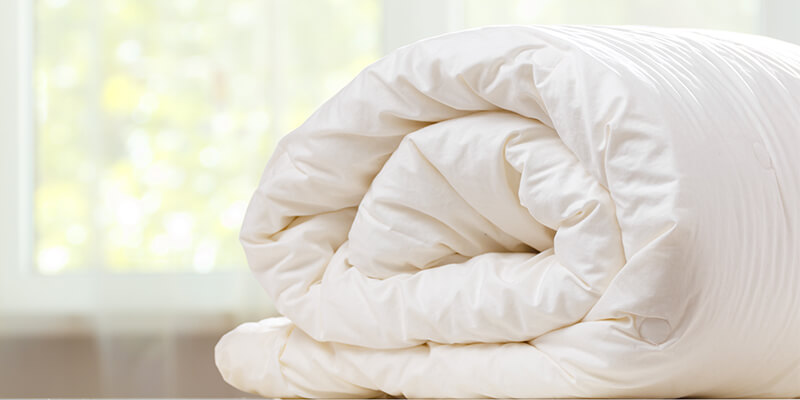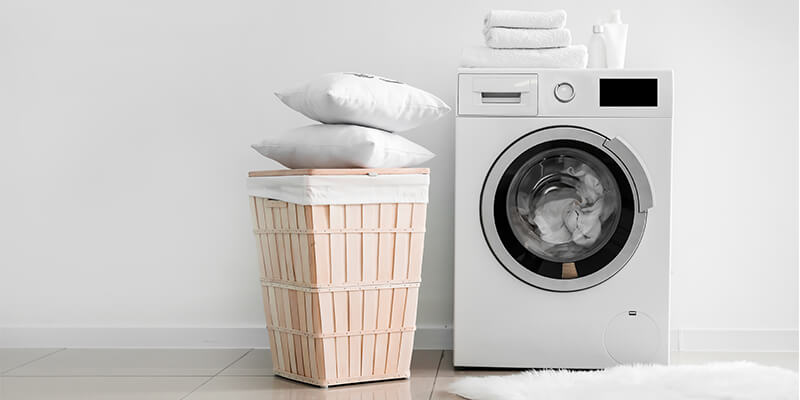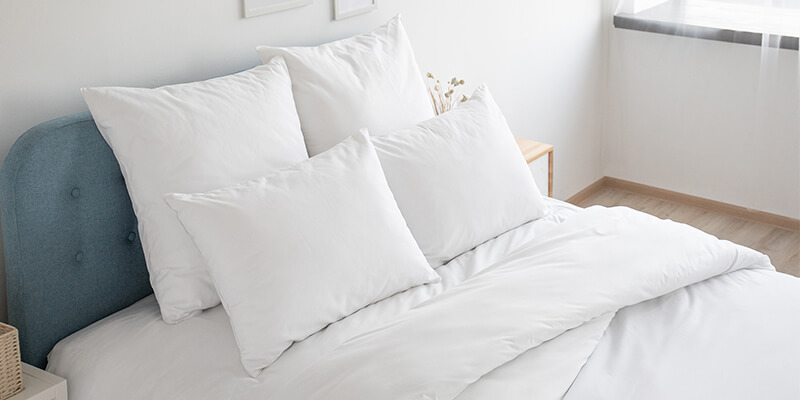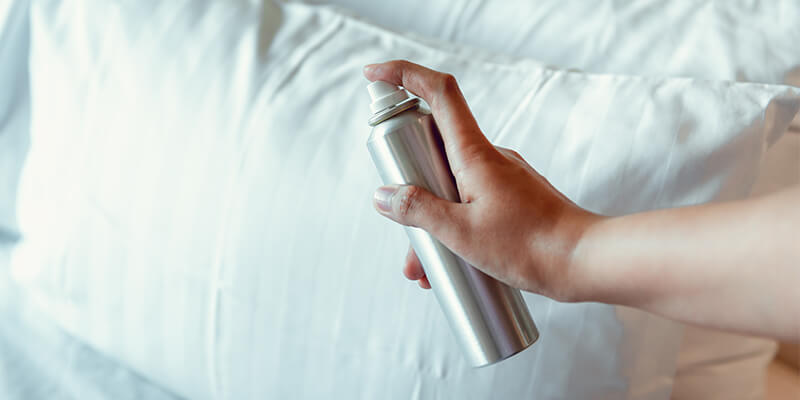Washing your clothes is a weekly chore that all of us have to endure, but have you ever thought about your duvet and bed set? Much like our clothes, our bed set becomes dirty over time, and needs to be washed regularly. This is even more so the case with the current climate of COVID-19, as you need to ensure that your home is as clean and safe as possible to remain healthy. However, there are certain steps that you will need to take to make sure that you are properly and thoroughly cleaning your duvet and bed set. For this reason, we have put together this comprehensive guide on how to wash a duvet and bed set to lend you a helping hand.
How To Wash A Duvet & Bed Set: A Comprehensive Guide
According to Express, a bed sheet that has not been properly washed in around eight years, can have up to 5kg of dead skin cells lurking on the surface. If that isn’t enough to make you want to instantly wash your bed sheets after reading this guide, then we don’t know what will! Although throwing your bedsheets in the washing machine may make your sheets look and smell fresh, failing to wash them with the right products and with the optimal temperature could be doing more damage than good.
However, having provided a laundry service in Milton Keynes for many years, we have perfected the art in washing and dry cleaning your duvet and bed sets. We have comprised our knowledge and put together a simple guide to help you wash your bedding at home. This guide includes the following:
- How Often Should You Change Your Bed Sheets?
- Know Your Symbols
- How To Wash A Duvet
- How To Wash Pillows
- How To Wash Your Bed Sheets
- How To Keep Your Sheets Smelling Fresh For Longer

How Often Should You Change Your Bed Sheets?
A question that clients often ask the team is “when should I change my sheets and how often?”. The answer to this question is pretty simple; you should be changing your bed at least once every other week, but we would advise to wash them every week and bring your bedding in for specialist duvet-cleaning services at least once a month. While many people think that this is only valid during the warm months, as we sweat in bed due to the higher temperatures, this couldn’t be further from the truth. Your bed can get just as filthy and dirty during the colder months as they do in the warmer ones, making it vital that you thoroughly clean your bedding on a regular basis.
Many clients also assume that it’s just the bed set that needs to be detoxed regularly, and the duvet and pillows often get neglected. This is because the duvet and particularly the pillows can soak up dirt such as saliva over time, which can leave a bad smell even after cleaning your bedsheets. As you sleep, your body continues to function, meaning that excess oils are still being released, which then imbed themselves into your bedding. For this reason, whenever you are planning on changing your bedsheets, we would always recommend giving your duvet and pillows a thorough wash as well.
There are many reasons as to why washing your duvet and bed set regularly can be beneficial, and this is particularly important for those with eczema or easily irritable skin. Some of these benefits include:
- Kill bacteria
- Deters dust mites
- Promotes comfort and wellbeing
- Removes sweat
- Minimises staining
Some people may find that they need to wash their sheets more often than others; this would include those that sweat a lot, do not wash before going to bed or allows a pet to sleep on the bed. You can find out more information about how often you should wash your bedding and what would warrant more regular washing on Healthline.

Know Your Symbols
Not every material can be washed the same, making it extremely important to check the care label on your bedding. The symbols on your care label will indicate how high the temperature should be and whether it can be tumble dried or ironed. Failing to follow the care label advice can cause your bedding to lose its colour, shrink or weaken the material. However, many of our clients find it hard to understand the symbols on the care label, so here are the most common symbols that you would find on bedding:

For more information about the different type symbols on care labels, take a look at our previous article.
How To Wash A Duvet
Your duvet is the largest item that will need cleaning, and it can be difficult to know whether it needs to be popped into the washing machine or hand washed. As discussed above, before you do anything with your duvet, check the care label, as this will give you an indication as to whether you need a lower or higher temperature. Additionally to this, you should also try and see if the duvet will fit in your home washing machine, and if not, it may be time to call in the professionals.
We would highly recommend that you wash in warm, but not hot water, around 30 degrees Celsius and on a gentle setting. For the detergent, always make sure that it is suited to you, as some can irritate the skin or cause allergies, such as asthma, to worsen. However, we would advise that you use a soft and mild detergent, such as Surf’s Tropical Lilly & Ylang Ylang Liquid Detergent, unless your duvet has a stain, in which case use a stronger detergent. You can find some of the best laundry detergents on Good Housekeeping, some of which are ideal for getting stains out of your duvet, and others are best for providing a fresh and clean smell.
Duvets can hold a lot of soapy water, so to make sure that it has been thoroughly washed and drained, we would advise to put it through the wash twice; once with detergent and once without. After you have washed your duvet, carefully remove from the washing machine, and only place into the tumble dryer if the care label instructs you to do so. If you are unable to tumble dry your duvet, then place it out in the garden to air dry until completely rinsed of water. For those that use a tumble dryer, make sure to air-dry the duvet before putting your covers on.
If you are worried about damaging your duvet, then please feel free to contact the team to book in for specialist duvet cleaning.

How To Wash Pillows
Much like the duvet, pillows can hold a lot of water, making it fairly hard to clean properly. Not only this, but pillows are made from either cotton, feather or synthetic materials, meaning that one cleaning method may not work well for all pillow types. If you are unsure about the material of your pillow, then you should be able to find this information on the care label. However, the majority of pillows should be able to go into the washing machine, they may just need to be at a different temperature depending on the material. It is important to make sure that your pillow is in good condition before you put it in the washing machine, as any splits can cause the filling to escape.
A top tip to making sure that your pillow doesn’t snag in the washing machine, is to pop it into a cover before throwing it in. When in the wash, make sure that it is on a gentle setting and use a mild detergent. Unlike your duvet, it is important to make sure that once washed, your pillows are dried as quickly as possible. The reason for this is because if left to air dry for a long period of time, the water can create mould, which is extremely dangerous and gives off an unpleasant smell. It is best to dry in a tumble dry, but if this can not be done, then dry in direct sun.

How To Wash Your Bed Sheets
There is a lot that can go wrong when washing your bed sheets, from shrinking to colour fading. This makes it even more important to read the care label before you begin washing, which should be completed around once a week. However, with the vast range of materials and colours used for bedding, it is important to make sure that you are washing them correctly according to their material. There are two common materials used for bedding, so we thought we provide instructions to washing them below.
Cotton Sheets
Most cotton bed sheets will be washed at around 40 degrees Celsius unless the care label says otherwise. Putting the wash any higher could cause the material to shrink, which can be extremely frustrating when trying to put your sheets back on the bed. However, if you have stains on your bedding, then you may wish to try on a higher setting; be sure to test on 10 degrees more each time, as setting it too high on the first go can cause damage.
If your duvet cover or pillows have a pattern, then make sure that you turn these inside out before placing them in the washing machine. This will help to prevent the colours from running and causing colour damage to the rest of the material as well as minimising colour fade. For the best results, we would advise that you try to line dry your cotton pillows, as this will give a fresh smell, but if you do need to tumble dry, this can be done without causing damage by placing on medium heat.

Silk Sheets
Silk tends to be one of the harder materials to keep in pristine condition, as a lot can go wrong. To minimise these risks, it is best to wash silk pillows, duvet covers or even clothes on their own. Alternatively, you can always place your silk pillows into a mesh laundry bag, which will allow you to thoroughly wash the bed set without damage. When washing the silk sheets, it is important to make sure that you keep the washing machine on a low temperature and use a mild detergent. After they have been washed, try not to place the pillows in direct sunlight as this can bleach silk. We would advise hanging them inside or use the tumble dryer on the lowest setting possible.

How To Keep Your Sheets Smelling Fresh For Longer
One of the many reasons clients like to wash their bedding regularly is because it can give the room a nice smell. Not only this, but it can actually help with your wellbeing by providing an organised and fresh environment, which can also help with sleep. However, after a few nights sleep in your bed, you may find that the fresh smell after washing disappears slowly. Luckily, there are a few ways that you can maintain the fresh smell on your bedding, which also comes with multiple other benefits as well.
Essential oils are the perfect way to naturally incorporate some floral smells into the room. Lavender is one of the best oils to use, as it can give a beautiful smell that takes over the room, while also helping with a good night’s sleep. If you do suffer from lack of sleep, then can you always purchase a pillow spray with a hint of lavender. Spray a small amount of the pillow spray onto the covers before going to sleep, and you can enjoy a fresh and natural smell while drifting off.
Another way to keep your sheets smelling fresher for longer is to spritz on some fabric freshener on the duvet and pillows. Febreze, for example, has a variety of different smells that are perfectly suited to everyone’s preferences. To enhance this freshness, we would advise that you open the windows in your room at least once a day to let air circulate.

Maintaining Fresh & Clean Bedding
It is important to clean your bedding regularly for many reasons, one of them being your health. With the current spread of COVID-19, it is more important than ever to ensure that your bedding is clean and hygienic. Keeping up with your washing not only makes your bedding smell clean and fresh, but it can also maintain the colour and shape of the bedding, saving you money in the future by limiting the need to replace bedding. If you would like a thorough cleaning service, then please feel free to contact our dry cleaners in Milton Keynes!
